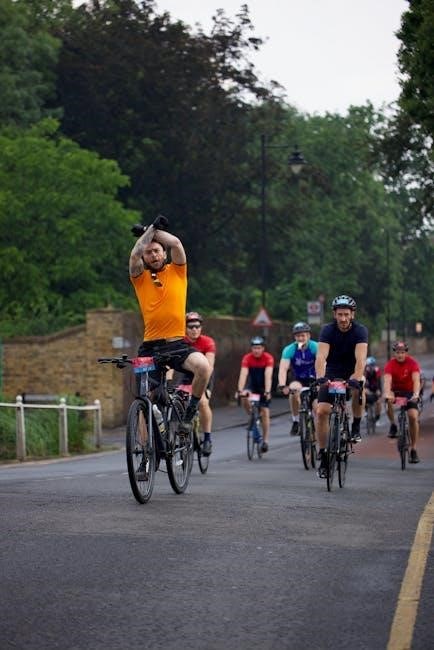Sport and exercise psychology explores the mental aspects influencing athletic performance and physical activity. Foundations of Sport and Exercise Psychology is a leading textbook connecting research, motivation, stress, and peak performance for students and professionals.
1.1 Defining Sport and Exercise Psychology: A Multifaceted Field
Sport and exercise psychology is the scientific study of psychological factors that influence physical activity and athletic performance. It examines how mental processes, emotions, and behaviors affect participation, motivation, and overall well-being in sport and exercise settings. This field integrates principles from psychology, physiology, and sociology to understand the complex interactions between mind and body. It focuses on enhancing performance, improving mental resilience, and fostering a positive experience for individuals engaged in physical activities. By addressing factors like stress, anxiety, and group dynamics, sport and exercise psychology provides a holistic approach to optimizing human potential in both competitive and recreational contexts.
1.2 Historical Development of Sport and Exercise Psychology
The field of sport and exercise psychology has evolved significantly over the past century. Early studies in the 1960s focused on personality traits and their relationship to athletic performance. Pioneers like Coleman Roberts and others laid the groundwork for understanding psychological factors in sports. The 20th century saw the establishment of formal organizations, such as the Association for Applied Sport Psychology (AASP) in 1986, which standardized practices and advanced research. Today, the field integrates diverse disciplines, including psychology, physiology, and sociology, to address motivation, stress, and performance optimization. This historical progression highlights the growing recognition of mental processes as critical to physical activity and athletic success.
1.3 Importance of Studying Sport and Exercise Psychology
Studying sport and exercise psychology is crucial for understanding the mental processes that drive athletic performance and physical activity. It provides insights into motivation, stress management, and peak performance, benefiting both athletes and non-athletes. By examining psychological factors, individuals can enhance their mental well-being, resilience, and overall quality of life. This field also offers practical applications for coaches, trainers, and educators, enabling them to create supportive environments that foster success. The textbook Foundations of Sport and Exercise Psychology emphasizes the importance of bridging theory and practice to optimize human potential. Ultimately, this discipline plays a vital role in promoting physical and mental health across diverse populations.

Personality and Sport
Personality traits significantly influence athletic behavior and performance. The textbook Foundations of Sport and Exercise Psychology explores how personality shapes motivation, behavior, and success in sports settings.
2.1 Sport Personality: A Paradigmatic and Methodological Analysis
Sport personality refers to the unique traits and characteristics that influence athletes’ behaviors and performances. A paradigmatic and methodological analysis explores how personality dimensions, such as conscientiousness and extroversion, impact athletic success. Research, as highlighted in Foundations of Sport and Exercise Psychology, examines the psychological frameworks and assessment tools used to understand sport personality. Vealey’s 1989 study provides a foundational analysis, emphasizing the role of personality in predicting performance and behavior. This section delves into the theoretical underpinnings and empirical methods that shape the study of sport personality, offering insights into how psychological traits contribute to athletic achievements and team dynamics.
2.2 Personality Traits and Their Impact on Athletic Performance
Personality traits significantly influence athletic performance by shaping behaviors, decision-making, and resilience. Traits like conscientiousness, extroversion, and neuroticism play pivotal roles. Conscientious individuals often exhibit discipline and adherence to training, enhancing performance. Extroverts tend to thrive in team environments, fostering cohesion and communication. High neuroticism, however, may lead to increased anxiety, potentially hindering performance. The textbook Foundations of Sport and Exercise Psychology highlights how understanding these traits can tailor interventions to optimize athlete potential. By identifying and leveraging personality strengths, coaches and psychologists can enhance motivation, adaptability, and overall success in sports. This connection underscores the practical application of personality research in athletic settings.
2.3 Assessing Personality in Sport and Exercise Settings
Assessing personality in sport and exercise settings involves using standardized tools to understand psychological traits and their impact on behavior. Common methods include questionnaires, interviews, and observational analyses. The Foundations of Sport and Exercise Psychology textbook emphasizes the importance of reliable and valid assessments to identify key traits like conscientiousness, extroversion, and emotional stability. These assessments help coaches and psychologists tailor interventions to individual needs, fostering better performance and well-being. By understanding personality characteristics, professionals can create personalized strategies to enhance motivation, resilience, and teamwork. Accurate assessments ensure effective application of psychological principles in real-world athletic environments.

Motivation in Sport and Exercise
Motivation drives athletic performance and engagement in physical activity. Foundations of Sport and Exercise Psychology highlights how understanding motivation enhances strategies to boost athletes’ drive and success.
3.1 Theories of Motivation: Understanding Why Athletes Perform
Theories of motivation in sport and exercise psychology explain why athletes engage in physical activity and strive for excellence. Self-Determination Theory suggests that intrinsic factors like enjoyment and personal growth drive motivation, while Extrinsic Motivation involves external rewards or pressures. Achievement Goal Theory focuses on how athletes perceive success, either through mastering skills or outperforming others. These frameworks help coaches and psychologists design interventions to enhance athlete engagement and performance. By understanding these theories, professionals can tailor strategies to foster resilience, satisfaction, and peak performance in athletes. Foundations of Sport and Exercise Psychology provides in-depth insights into these theories, connecting research to practical applications.
3.2 Intrinsic vs. Extrinsic Motivation: Implications for Athletic Behavior
Intrinsic motivation arises from internal factors, such as personal satisfaction, enjoyment, and a desire to improve, while extrinsic motivation is driven by external rewards, recognition, or pressure. Athletes with strong intrinsic motivation tend to exhibit greater persistence and enjoyment in their sport, as they are driven by personal fulfillment. Conversely, extrinsic motivation, while effective in the short term, may lead to decreased interest if rewards are withheld. Understanding this distinction is crucial for coaches and psychologists to create environments that foster sustained engagement and peak performance. Foundations of Sport and Exercise Psychology highlights these dynamics, emphasizing the importance of balancing both types of motivation to optimize athletic behavior and overall well-being.
3.3 Enhancing Motivation: Strategies for Coaches and Trainers

Coaches and trainers play a pivotal role in fostering motivation among athletes. Setting clear, achievable goals helps athletes maintain focus and track progress, enhancing intrinsic motivation. Providing constructive feedback and positive reinforcement encourages persistence and builds confidence. Creating a supportive team environment, where collaboration and camaraderie are emphasized, can also boost engagement. Additionally, understanding individual differences in motivation allows for personalized approaches, ensuring each athlete feels valued and driven. Foundations of Sport and Exercise Psychology emphasizes these strategies, highlighting their impact on sustaining motivation and promoting long-term success in athletic pursuits.
Arousal, Stress, and Anxiety in Sport

Arousal, stress, and anxiety significantly impact athletic performance. Understanding these psychological and physiological responses is crucial for optimizing focus and maintaining peak performance under pressure.
4.1 Understanding Arousal and Its Effects on Performance
Arousal refers to the physiological and psychological state of heightened activity in response to stimuli. In sport, optimal arousal levels enhance focus and physical execution, while excessive or insufficient arousal can hinder performance. Research indicates that athletes perform best when arousal matches the task’s demands. For example, fine motor skills require lower arousal, whereas high-intensity activities benefit from higher arousal. Managing arousal is critical, as chronic under-arousal may lead to complacency, and over-arousal can cause anxiety and decreased precision. Techniques like relaxation exercises and visualization help athletes maintain optimal arousal, ensuring peak performance under pressure.
4.2 Stress and Anxiety: Psychological and Physiological Responses
Stress and anxiety are common experiences in sport, triggered by competitive pressure, fear of failure, or high expectations. Psychologically, stress can impair decision-making, reduce focus, and lower confidence, while anxiety often manifests as tension or apprehension. Physiologically, stress activates the body’s “fight-or-flight” response, increasing heart rate, blood pressure, and muscle tension. Chronic stress can lead to fatigue, decreased motivation, and burnout. Anxiety, if excessive, can hinder motor skills and overall performance. Understanding these psychological and physiological responses is crucial for developing strategies to manage stress and anxiety, enabling athletes to maintain composure and execute skills effectively under pressure.
4.3 Managing Stress and Anxiety for Optimal Performance
Effectively managing stress and anxiety is crucial for peak performance in sport. Techniques such as relaxation training, cognitive restructuring, and goal setting can help athletes maintain emotional balance. Relaxation methods, including deep breathing and visualization, reduce physiological tension, while cognitive strategies address negative thought patterns. Setting realistic goals enhances focus and confidence. Additionally, sleep, nutrition, and recovery play vital roles in maintaining mental resilience. Coaches and athletes can also benefit from creating a supportive environment and fostering positive communication. By implementing these strategies, individuals can better cope with stress and anxiety, leading to improved performance and overall well-being in competitive settings.
Competition and Cooperation in Sport
Competition drives athletes to excel, fostering resilience and peak performance, while cooperation builds team cohesion and communication, essential for collective success in sports.
5.1 The Psychology of Competition: Winning and Losing

Competition in sports is deeply influenced by psychological factors, including motivation, emotions, and mental resilience. Winning often enhances self-confidence and intrinsic motivation, while losing can trigger anxiety or frustration. Athletes’ responses to competition are shaped by their personality traits, such as competitiveness and perfectionism. The pressure to perform can elevate arousal levels, impacting decision-making and skill execution. Additionally, the fear of failure and the desire for recognition play significant roles in competitive settings. Understanding these psychological dynamics is crucial for optimizing performance and fostering a healthy mindset. Strategies like goal-setting and emotional regulation can help athletes navigate the pressures of competition effectively, ensuring sustainable success and personal growth.
5.2 Cooperation in Team Sports: Building Cohesion and Communication
Cooperation in team sports is vital for achieving collective success. It fosters cohesion, trust, and effective communication among athletes, enabling them to work toward shared goals. Empirical research highlights that teams with strong interpersonal bonds and clear role definitions perform better. Communication strategies, such as active listening and constructive feedback, enhance collaboration. Additionally, shared mental models and mutual respect create a positive team culture. The Foundations of Sport and Exercise Psychology textbook emphasizes that teamwork is not just about individual skills but about harmonizing efforts. Coaches play a crucial role in promoting cooperation through team-building activities and encouraging open dialogue, which strengthens overall performance and resilience.

5.3 Balancing Competition and Cooperation for Success
Balancing competition and cooperation is essential for achieving success in sports. Competition drives athletes to excel, fostering resilience and peak performance, while cooperation builds trust and teamwork. The Foundations of Sport and Exercise Psychology highlights that this balance enhances overall success. Coaches and leaders must encourage healthy rivalry while promoting collaborative goals. Strategies like shared role clarification and open communication help maintain this equilibrium. When athletes understand the value of both competing and cooperating, they create a harmonious environment that maximizes individual and team potential, leading to sustained success and fulfillment in sports.
Feedback and Its Role in Sport and Exercise
Feedback is crucial for skill refinement and performance enhancement in sport and exercise. It provides insights for improvement, helping athletes and coaches refine techniques and strategies effectively.
6.1 The Importance of Feedback in Skill Development
Feedback is a cornerstone of effective skill development in sport and exercise, enabling athletes to understand their performance and identify areas for improvement. According to Foundations of Sport and Exercise Psychology, feedback provides valuable insights into strengths and weaknesses, guiding targeted practice and enhancing learning. Coaches and trainers play a pivotal role in delivering constructive feedback, ensuring it is specific, timely, and actionable. This process fosters accountability and motivation, helping athletes refine techniques and achieve their full potential. Effective feedback strategies are emphasized as a key component of successful skill acquisition and performance optimization in both individual and team settings.
6.2 Effective Feedback Strategies for Coaches and Athletes
Effective feedback strategies are essential for fostering skill development and performance improvement in sport and exercise settings. Coaches should provide feedback that is specific, timely, and actionable, focusing on observable behaviors rather than personal traits. According to Foundations of Sport and Exercise Psychology, combining positive reinforcement with constructive criticism enhances motivation and encourages growth. Athletes also benefit from self-assessment tools, allowing them to reflect on their performance and set realistic goals. Coaches should create a supportive environment where feedback is welcomed as a tool for improvement. Regular, balanced feedback helps athletes refine techniques, build confidence, and achieve optimal results in training and competition.
6.3 The Impact of Feedback on Motivation and Performance
Feedback plays a crucial role in enhancing both motivation and performance in sport and exercise settings. According to Foundations of Sport and Exercise Psychology, positive and constructive feedback can boost intrinsic motivation, encouraging athletes to set and pursue personal goals. When feedback is specific and timely, it fosters a sense of accomplishment, reinforcing desirable behaviors. Conversely, overly critical feedback may diminish motivation and confidence. Effective feedback also improves performance by clarifying expectations and guiding skill refinement. Athletes who receive regular, balanced feedback tend to exhibit greater resilience and adaptability, leading to overall better outcomes in training and competition. Thus, feedback is a powerful tool for optimizing both psychological and physical performance.

Case Studies and Practical Applications

Case studies illustrate real-world applications of sport and exercise psychology, demonstrating how theories enhance peak performance. Practical strategies for coaches and athletes are explored, bridging theory with actionable insights from Foundations of Sport and Exercise Psychology.
7.1 Real-World Examples of Sport and Exercise Psychology in Action
Sport and exercise psychology is applied in various real-world settings, enhancing performance and well-being. For instance, elite athletes use psychological strategies like visualization and mindfulness to maintain focus under pressure. Coaches employ motivational techniques to foster teamwork and resilience. In exercise settings, psychologists design interventions to promote adherence to fitness programs. Case studies highlight how stress management and anxiety reduction techniques improve outcomes. Educational programs also integrate these principles to train professionals. These examples demonstrate how theories from Foundations of Sport and Exercise Psychology are translated into practical solutions, benefiting both athletes and individuals in everyday physical activity.
7.2 Applying Theories to Practical Scenarios
Theories in sport and exercise psychology are essential for addressing real-world challenges. For example, the self-determination theory is applied to enhance intrinsic motivation in athletes, while goal-setting theory helps individuals achieve specific performance targets. Practitioners use these frameworks to design interventions that improve adherence to exercise programs and reduce anxiety. Coaches apply motivational techniques to foster a positive team environment. Additionally, psychological skills training, such as visualization and mindfulness, is used to enhance performance under pressure. By translating theoretical concepts into actionable strategies, professionals in the field empower individuals to overcome obstacles and achieve their full potential in both competitive and recreational settings.
7.3 The Role of Sport and Exercise Psychology in Enhancing Peak Performance

Sport and exercise psychology plays a pivotal role in optimizing performance by addressing psychological factors that influence athletes. Techniques such as goal-setting, visualization, and mindfulness are widely used to enhance focus and resilience. Understanding motivation theories helps practitioners tailor interventions to drive athletes toward their best outcomes. Additionally, managing arousal and stress through strategies like relaxation training can improve consistency in high-pressure situations. By fostering a growth mindset and promoting self-confidence, sport psychologists empower athletes to overcome challenges and achieve peak performance. These evidence-based approaches, as detailed in foundational texts like Foundations of Sport and Exercise Psychology, provide actionable tools for maximizing potential in competitive and recreational settings alike.

